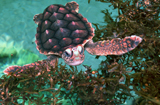Observing Sea Turtles
From spring through fall, you may notice sea turtles on the beach. This is the time female sea turtles travel across beaches to lay eggs in the sand (known as nesting). In addition to female sea turtles, you may also see sick, injured, or dead sea turtles anytime of the year. Use the following guidelines if you happen to see these endangered animals:
- Don’t disturb nesting turtles; Make sure you’re at least 50 feet away from them, stay quiet, and keep lights off, including flashes from cameras.
- It may look like a nesting sea turtle needs help because it’s moving slowly and pauses often. This is normal behavior, however, so don’t try to help a sea turtle.
- The guidelines for observing nesting turtles should also be followed when you encounter a hatching nest—stay back, turn off all lights as not to distract the baby sea turtles, and don’t help them navigate (they must learn how to do this on their own).
- Contact the Florida Fish and Wildlife Conservation Commission (FWC) if you spot a sea turtle that is injured, dead, stranded, or needs assistance.
- Sick or injured sea turtles may have been washed ashore—you can often tell they are hurt because they likely won’t move far above the tide line. Never touch a sick or injured sea turtle, as handling them could make their injuries worse. Additionally, sea turtles may bite if they’re sick, scared, or harassed.
- You may see a turtle marked with spray paint, which means the turtle has already been found and reported. There’s no need to contact the FWC.
- Never take all or parts of sea turtles (dead or alive), as they are a protected, endangered species. Doing so is considered a felony offense.
Protecting sea turtles is important for their survival. If you witness someone disturbing sea turtles or you notice a sick, injured, stranded, or dead sea turtle, then contact the FWC.
Excerpted and adapted from:
L. Nester and W. M. Giuliano, “Sea Turtle Identification and Viewing Guidelines” (WEC209), UF/IFAS Department of Wildlife Ecology and Conservation (rev. 06/2012).

Related Sites & Articles
- Hot Topics
- Florida's Water Resources
- Water Conservation
- UF/IFAS Publications
- Laws that Protect Florida's Wildlife
- The Value of Endangered Species: the Importance of Conserving Biological Diversity
- UF/IFAS Sites
- Florida Sea Grant
- Florida Wildlife Extension
- Other Sites & Publications
- Sea Turtle Education and Information--Florida FWC
- Where to View Sea Turtles--Florida FWC

